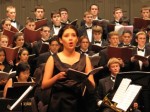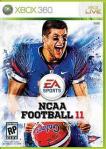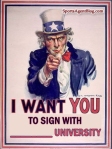College Sports: Preparation for Life or for Pro Sports
Elite collegiate sports have been criticized and undermined frequently in current times; often to the point of some sports being removed from the schools. The critics come from all sides; the media, the other professors, even the “student-athletes” themselves have cause to complain. I agree that the focus of collegiate sports is to centered on winning and making money, for everyone but the athletes. It appears to me that college sports are often seen as the stepping stone for professional sports, even if that is not the case. But I can hardly be blamed for this perception since the media coverage and intensity of the games themselves provide adequate substance for my claims.
Prior to five days ago, I had two notions about college sports: 1) What does it matter if college sports are basically the minor leagues of professional sports; and 2) elite collegiate sports should have nothing to do with college campuses, especially if they are basically the minor leagues for professional sports. Well, I have come to realize the error in this way of thinking, and the funny thing is that this is not a result of ignorance—since I believed myself educated in the matter of sports—but a matter of one-sided thinking. I’d never thought of it from the athlete’s perspective nor with the true purpose of higher education in mind. After a little bit of education, some of which was a little heavy handed in its opinions, I think more wholly on the issue. I still feel that there is a problem with elite collegiate sports, but now the question boils down to the purpose of collegiate athletics: to prepare, educate students factual and physical knowledge that will aid them in their future endeavours in life; or to train and prepare them for the possibility of a professional career in sports.
Reading an article by Myles Brand, “The Role and Value of Intercollegiate Athletics,” I came to understand that the life of a “student-athlete” is not dissimilar from the student
studying any performing art (music, art, band, choral, etc.). Both have grueling schedules that require hours of practicing their skill, showcasing their talent in front of an audience—which attendees often pay to attend—or competing against one another for top spots in their sections. Both types of students often choose their schools based on the programs they want to enter into, and among both groups a transition into a professional career performing their talent is not the purpose of the majority of the students. However, a stigma associated with student-athletes is that they don’t learn the history of the sport they play nor anything else except how to play and how to win. This is compared to the music majors, for example, that have to learn the history behind the pieces they will sing, the impact these pieces have on society, the genre they belong to and how they are classified into such genres (just to name a few).
Brand suggested coaches actually be teachers, instructing such information about their sport to the students who want to play the sport. Brand believes this will foster a deeper commitment to the love of the game and help curb the glutenous appetite for winning, especially at all costs. I know such classes like the history of sports are offered, albeit not always required for Kinesiology majors, but like Brand suggests, making such classes required in order to play sports and making them accredited courses would do two things: 1) help student-athletes accumulate credits to help them graduate (and being of a subject they obviously have an interest in would increase the likelihood of them passing without any problems); and 2) would serve doubly for coaches in that they will have to be educated themselves and would warrant the exorbitant pay many college sport coaches already receive. Brand was not the only philosopher to note the similarity in these two types of students. Robert Simon in a chapter entitled “Sports on Campus: Intercollegiate Sports and Their Critics” made similar observations. Yet, no one complains or champions the efforts of the students of the performance arts.
Simon expounds more on the purpose of institutions of higher learning and how athletics fit into that purpose. For those the fear that college for the athlete is more difficult than actually being on the field underestimate the the values and skills that sports teach that can easily translate into making a greater student. Critical thinking through self evaluation and concentration despite external pressures, even the ability to find creative solutions to their problems. Simon was extensive in covering both sides of the issue and still come up with how sports can benefit universities and campus life. Both Brand and Simon realize that college sports have been problematic in the past—and the present—but know that if intercollegiate sports are more integrated with academia, instead of being outcasts or shunned, many of these problems can be resolved. The purpose of any college/university, despite what any mission statement may say, is to advance the knowledge of its students, to help them think critically about all sides of an issue, and to be better citizens and better people that can make the world a better place to live in. Sports can be beneficial in accomplishing these purposes, at the very least as helpful as the performing arts.
The rather over-use of the term “student-athlete” should be taken more literally and not be used to withhold benefits from the students who work hard to accomplish mastery of athletic ability. The Atlanta Magazine article “The Shame of College Sports,” by Taylor Branch, takes a hard look at the abuse of this term and the people it harms. Branch goes so far to say that student-athletes are basically slaves to their schools and the NCAA which governs collegiate sports through brutish tactics. Yes, “student-athletes” can receive no compensation whatsoever for their efforts while the university (in particular the athletic department) and the NCAA receive all the benefits that would go to anyone else in a similar situation. But to go as far as to call them slaves is a bit much for me. Scapegoats, sacrificial lambs, those who receive all, or nearly all, the blame for when so many are involved in misdeeds, they are. But, if the students who want to be athletes don’t want to suffer these indignities they should work hard at excelling in some other educational pursuit causing a rapid decline in the available beasts of burdens to exploit.
I know this may seem unfair for those in the lower end of the socioeconomic spectrum, having less resources available to make a pursuit in something other than the most popular sports, but it can be done because it does happen. Not every Black kid who graduates high school becomes a football player or basketball player. These sports tend to have the highest proportion of Black athletes but that doesn’t mean that is all they can accomplish, it is just a statistic. Branch’s article also mentions the purpose of universities and colleges but his opinion is how their purpose seems to be preparing athletes for major league sports as oppose to receiving a decent education and bettering the students who in turn better their community. The point Branch seems to make is quite similar to both Brand and Simon in that colleges and universities need to re-evaluate the purpose for having sports a part of their campus identity. Is their purpose to prostitute eager and willing athletes to bring “honor” and “prestige” to their name or is it to provide a well-rounded education to students who want to engage in competitive athletics. Branch fears it is the former, and blames—in part—the NCAA for their role in treating “student-athletes” like pawns in their game to be manipulated however they like, in accordance to the wishes of the various schools.
So I ask the question: Why do institutions of higher learning have athletic programs? Are they expecting students to voluntarily give up their liberties, to become mindless robots whose only goal is win and bring popularity to the school? Do they attempt to educate athletes about how sports impact society, both positively and negatively, and how the lessons learned on the field can translate into the classroom and eventually to their future career? Is it just a way to drain off excess energy of tense students? The study of Kinesiology has had a tumultuous history. It has had to overcome the stigma that anyone interested in physical skills, in sports or exercise, was a “jock,” essentially a walking talking over muscled ignoramus who couldn’t cut it as a professional athlete or a serious scholar. Sadly, the revealings of many “student-athletes” being able to pass their classes only by teachers forgiving grades, or other students taking tests for them, or worse yet grade alterations at the highest level; hurts much of the effort that has been taken to eliminate the “jock” stereotype. We see this stereotype played out in movies, on television, littered throughout the media, even today. As a student who loves sports, studies Kinesiology, but does not engage in sports at the intercollegiate level, it is difficult not to take offense. But the students are not the only guilty party. Branch colorfully demonstrated that student-athletes are mere puppets for their coaches, for the universities, for the NCAA, which clearly indicates there is plenty of blame to go around.
All three authors mention how America is the only country in the world, a world filled with many prestigious universities, that actually has sports as part of the school. Everywhere else there are clubs that provide the proving ground for all those who want to be professional athletes. They don’t tell their young men and women, “Hey, if you want to play sports professionally someday then you have to go to an approved university to attempt an education you probably don’t want and might not even be able to obtain without tons of
help, oh and you won’t be compensated for any revenue you bring in if you prove successful or if you happen to be injured and unable to do anything the rest of your life.” Only in America is this possible. To make matters worse, not everyone who joins the college team does so with hopes of making it to the pros, but they still have to suffer as if they did. What would it take to send both the professional leagues, the NCAA, the media (because they are just as culpable as the rest of them), and the universities themselves all to understand that college life is not about making money (because hardly any college student actually has any money), it is not about becoming famous, it is about learning, about “higher” learning. What lesson do we want taught: life sucks, deal with it; or life is hard, make it better?
How can this be solved? Removing the prestigious sports (football, basketball, baseball) from college campus may be harsh but it could be the wake-up call everyone needs. Each of the authors admit that sports rarely contribute much income to the school. Often they cost more money then they make. But, maybe instead of cutting out sports completely, let’s make serious cuts to the spending on these sports or cover these costs by integrating academic classes with the sport, like history, societal impact, etc. Rein back the pressure to beat the rivals, to demonstrate superiority, for athletics do not determine a school’s success. Revive the spirit of fun in the games, of “friendly competition,” which would also make the schedule less hectic for the student who participates in athletics. Encourage, or bully if necessary, the major leagues to create minor leagues for those who want to be professional athletes and back away from demanding participation in collegiate sports (supervised by the NCAA). We know college is not for everyone. Scholarships for athletic students are perfectly acceptable, as long as it is clear that they are excellent students who happen to be good at sports, and not excellent athletes who might not educationally merit college admission.
I see the benefit of keeping intercollegiate sports when I notice all the different lessons taught by having teams. Students who are studying athletic training, sports medicine, physical therapy coaching techniques, strength and conditioning, and the list keeps going. These students benefit by having somewhere to put their book learning into practice. Overall it all boils down to the purpose of intercollegiate sports: Is it to aid the student in preparing for life after school, or is it to bring fame and glory to the school while preparing the athlete for a professional career?



